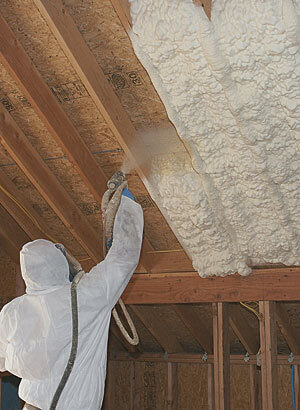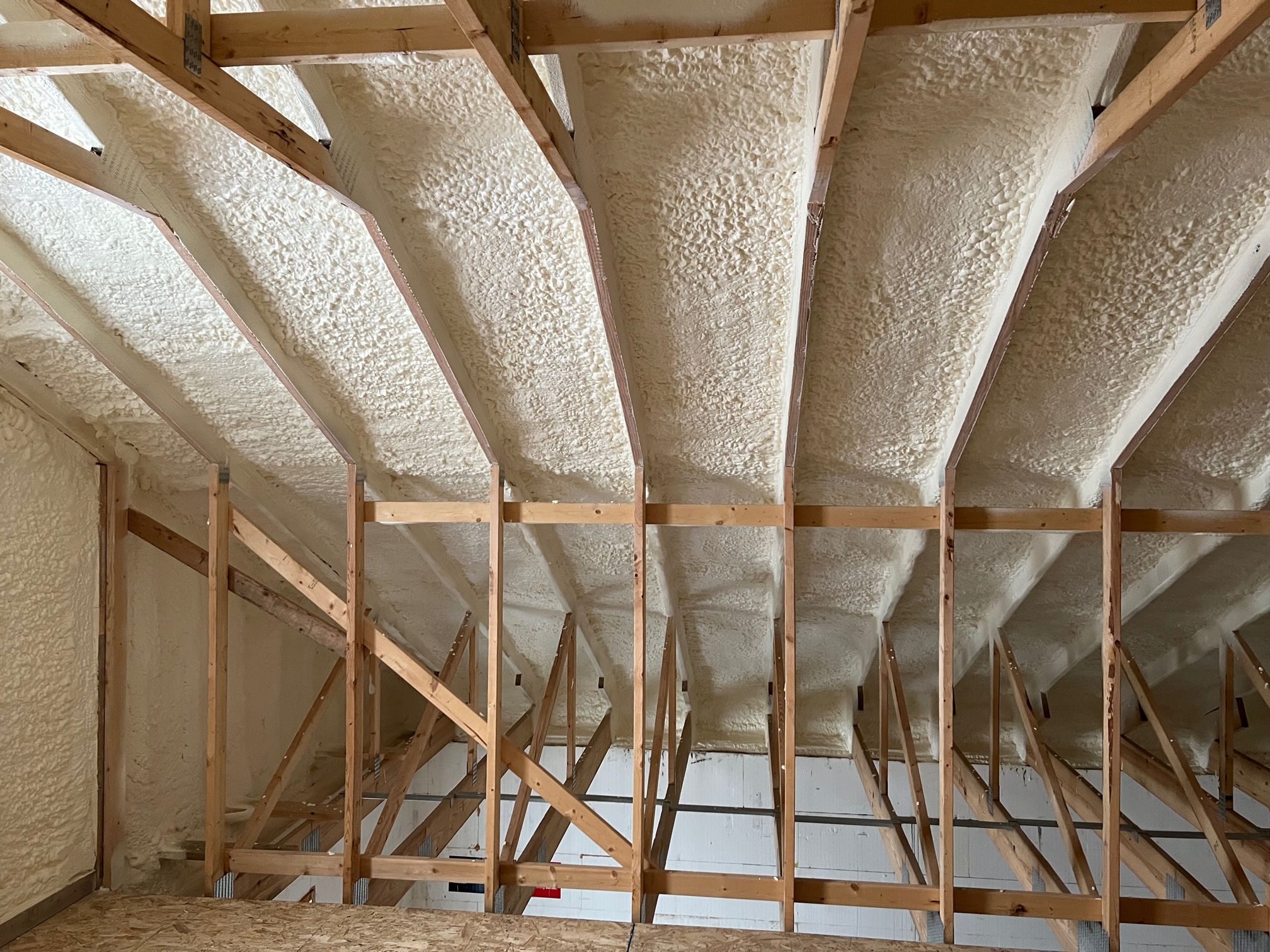The Ecological Impact of Spray Foam: Sustainability Considerations
The Ecological Impact of Spray Foam: Sustainability Considerations
Blog Article
Spray Foam: The Ultimate Service for Air Sealing and Insulation
Spray foam insulation has arised as a leading service for reliable air sealing and thermal insulation, supplying an one-of-a-kind combination of residential properties that set it aside from standard techniques. Its ability to expand and load voids makes it especially effective in preventing air leakage, which can dramatically impact energy performance. Nonetheless, recognizing the complete extent of its benefits, installment procedures, and contrasts with various other insulation kinds is important for making educated decisions. As we check out these aspects, the effects for both new buildings and retrofits become progressively significant. What factors should affect your selection?
What Is Spray Foam?
Spray foam is a functional insulation product that combines the concepts of air sealing and thermal resistance to boost power effectiveness in buildings. Composed mainly of polyurethane or various other comparable substances, spray foam is used as a fluid that increases upon contact with surface areas, creating a solid, continual layer of insulation. This unique residential property enables it to fill voids, cracks, and gaps that typical insulation products may overlook, supplying a premium air seal.
There are two main kinds of spray foam: open-cell and closed-cell. Open-cell spray foam is lighter and much more versatile, offering superb noise absorption and a lower R-value per inch - Spray Foam. In comparison, closed-cell spray foam is denser, offering a higher R-value, moisture resistance, and added architectural stability to building components
The application procedure normally includes specific equipment, making certain a seamless application that sticks to different substrates, consisting of concrete, steel, and wood. This adaptability makes spray foam ideal for both new buildings and retrofitting existing structures. Its capability to develop an impermeable barrier considerably adds to minimizing power consumption and enhancing indoor air quality, thus making it a preferred choice amongst builders and home owners alike.
Advantages of Spray Foam Insulation
One of the most substantial benefits of spray foam insulation is its outstanding capacity to produce a constant air obstacle, which effectively reduces energy loss. Unlike standard insulation products, spray foam broadens to fill up cracks and spaces, ensuring that air leakage is drastically reduced. This characteristic not only enhances power efficiency yet additionally brings about decrease utility expenses gradually.
Additionally, spray foam insulation offers exceptional thermal resistance, adding to a more steady interior atmosphere. Its high R-value per inch permits effective insulation in constrained areas, making it suitable for attics, walls, and crawl spaces. The moisture-resistant residential properties of spray foam assistance stop mold and mold growth, promoting much healthier living problems.
Another essential advantage of spray foam insulation is its sound-dampening qualities (Spray Foam). It efficiently reduces noise transmission in between rooms, creating a quieter and a lot more comfy home environment. The toughness of spray foam also stands apart, as it does not sag or work out in time, keeping its performance throughout its life-span
Just How Spray Foam Works
Recognizing just how spray foam insulation functions is vital for valuing its performance in air sealing and thermal resistance. Spray foam insulation is composed of 2 primary components: isocyanate and polyol material. When these elements are mixed, they undertake a chemical reaction that triggers the product to increase quickly, producing a dense foam that loads voids, cracks, and dental caries.
As the foam expands, it abides by surface areas, creating an airtight seal that significantly lowers air infiltration. This characteristic makes spray foam insulation extremely reliable at preventing drafts and dampness go penetration, which can cause power loss and damages over time. Furthermore, the closed-cell version of spray foam supplies superior thermal resistance as a result of its stiff framework, properly decreasing warm transfer.
The one-of-a-kind properties of spray foam enable it to satisfy irregular surface areas, making sure thorough insurance coverage and a smooth barrier. Therefore, spray foam insulation not just boosts power effectiveness however additionally contributes to boosted indoor air quality by lowering the buildup of contaminants and irritants. Ultimately, understanding the technicians behind spray foam highlights its duty as a premium choice for insulation and air sealing in both commercial and household applications.
Installation Refine Introduction

Prior to installment, the room must be adequately cleaned and prepped, making sure that surfaces are cost-free from moisture, dirt, and debris. Since contaminants can compromise bond and general performance, this action is crucial. When the area is prepared, the application involves blending both elements of the spray foam, which increases upon contact and fills gaps properly.
Trained professionals ought to perform the setup, making use of specialized tools to guarantee uniform protection and optimum density. Security safety measures, consisting of putting on safety equipment and ensuring correct air flow, are imperative during this process. After application, the foam normally treatments promptly, forming a solid obstacle that enhances energy efficiency.
Contrasting Spray Foam to Conventional Insulation
When reviewing insulation alternatives, spray foam insulation stands out in contrast to conventional products such as fiberglass and cellulose. One of the primary advantages of spray foam is its exceptional air securing capabilities. Unlike fiberglass and cellulose, which can permit air infiltration, spray foam broadens upon application, loading holes and gaps to develop an impermeable seal. This results in improved energy effectiveness, as much less heated or cooled down air leaves the home, bring about reduced utility bills.
In addition, spray foam supplies a greater R-value per inch than typical insulation kinds, using even more effective thermal resistance in a thinner account. This characteristic is particularly useful precede with minimal dental caries depth. Additionally, spray foam is immune to wetness and mold development, which can be a substantial interest in cellulose and fiberglass, especially in moist environments.
Nevertheless, spray foam insulation normally brings a higher upfront price than its traditional counterparts. Homeowners must evaluate this first investment against lasting energy cost savings and performance advantages. Eventually, while both insulation kinds offer their function, spray foam arises as an advanced service for modern-day insulation requirements, especially in terms of air sealing and thermal efficiency.

Verdict
In recap, spray foam insulation stands for a very reliable remedy for attaining ideal air securing and More about the author thermal resistance. Its one-of-a-kind buildings, including dampness resistance and noise dampening, make it ideal for various applications in both new constructions and retrofitting projects (Spray Foam). The first costs may be higher compared to traditional insulation products, the long-term benefits, such as considerable energy cost savings and enhanced interior air high quality, justify the financial investment and underscore its value in contemporary structure methods.
Spray foam insulation has emerged as a leading solution for efficient air sealing and thermal insulation, supplying an unique combination of residential or commercial properties that establish it apart from standard techniques.Spray foam is a functional insulation material that incorporates the principles of air sealing and Get the facts thermal resistance to boost power effectiveness in buildings.When evaluating insulation options, spray foam insulation stands out in contrast to typical products such as fiberglass and cellulose. Eventually, while both insulation types offer their purpose, spray foam arises as a more sophisticated service for contemporary insulation demands, specifically in terms of air securing and thermal efficiency.
In recap, spray foam insulation represents an extremely efficient remedy for achieving optimum air securing and thermal resistance.
Report this page